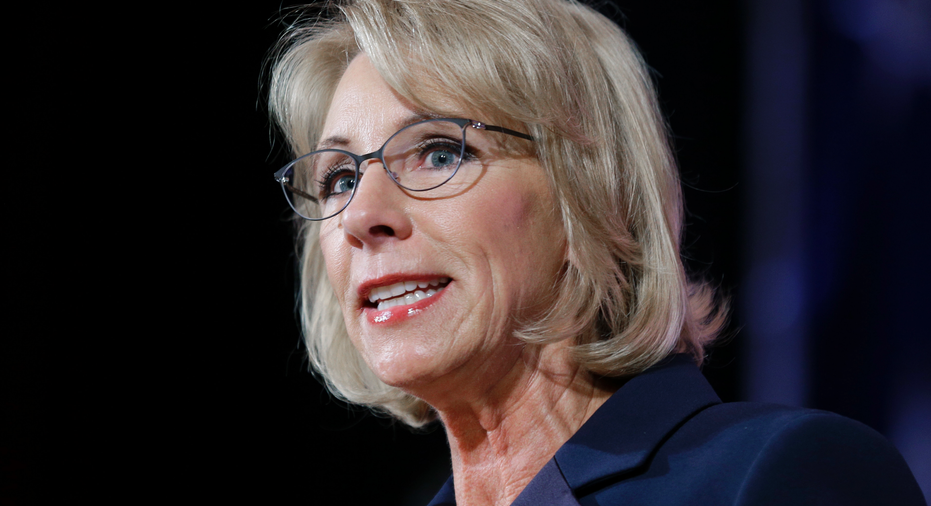Republican tax bill furthers DeVos' push for school choice

WASHINGTON – Education Secretary Betsy DeVos' school-choice agenda is getting a bit of a boost from the Republican tax bill, which would allow parents to use education savings accounts to pay tuition at private elementary and secondary schools.
Yet some conservative groups favoring school choice say the tax bill doesn't help low-income families.
Expanding school choice — access to charter, private and other options besides neighborhood schools — has been a top priority of the Trump administration and DeVos, who has spent decades working on that front in her home state of Michigan.
But nine months into her tenure, DeVos has yet to come forward with a major school choice initiative, which her supporters have been hoping for and her critics have feared. The tax proposal, unveiled Thursday, stops significantly short of the $20 billion school-choice project that President Donald Trump promised on the campaign trail.
Under the GOP bill, parents would be able to use up to $10,000 per year from a 529 education savings account to pay for K-12 education; that account was previously restricted to college tuition and expenses. At the same time, the bill calls for phasing out the Coverdell savings account, which offered similar tools but capped the contributions at $2,000 annually, and rolling it into the 529.
"This is a good step forward, reflecting that education should be an investment in individual students, not systems," DeVos said in a statement. "I look forward to continuing to work with congressional leaders to ensure all families have equal access to the education that meets their child's unique needs."
The American Federation for Children, a school choice advocacy group that DeVos used to head, praised the idea of expanding the 529 accounts to elementary and secondary schools students, but warned that low-income families have fallen through the cracks.
John Schilling, CEO of the group, said in a statement that its members are "concerned about and focused on those families who do not have 529s, typically low-income families who aren't able to put away those savings, who are looking for more and better educational options for their children."
Rick Hess, director of education policy at the conservative American Enterprise Institute, said that the change will have a "very modest impact," since a 529 savings account is not tax-free and only exempts one from paying taxes on the return to investment. That, he said, doesn't amount to much, unless the account has existed for many years.
Mike Petrilli, the president of the conservative Thomas B. Fordham Institute, said the change will benefit wealthy families who already have money to pay for private school and who have enough money to set aside to make the savings account work.
"It sure doesn't do much to fulfill the president's campaign promises around school choice," Petrilli said. "It's telling that they couldn't find the money to support a program for low-income students, but they did find a way to give a major new benefit to affluent parents who send their children to private schools."
He added: "The benefits can now flow to the wealthy. It seems like a subsidy for people that don't need it."
Hess cautioned, however, that it would be unfair to put all the blame for making little progress on school-choice reform solely on DeVos, saying that with the president distracted by political controversies, she focused on advocacy.
"She has used the bully pulpit to make the case for school choice and to bring attention to school choice," Hess said. "If DeVos had a popular president and a focused White House behind her, they might have been able to do it, but that's not the world that we live in."
Experts are debating how effective DeVos' advocacy has been. While she has surely brought the topic of school choice to the center of national attention, some, even among her supporters, believe that DeVos' polarizing presence may have alienated some families who had previously favored school reform. An August study by Education Next, a journal published by Harvard's Kennedy School and Stanford University, showed that support for opening more charter schools has dropped significantly, but there's less opposition to expanding private school voucher programs.
Lily Eskelsen Garcia, president of the National Education Association, the country's largest teachers' union, assailed the tax bill, saying it benefits the wealthy and takes away resources from public schools.
"The tax plan released by House Republican leaders and backed by President Trump is a massive tax giveaway to the wealthiest individuals and corporations funded on the backs of students and working families," Eskelsen Garsia said in a statement. "Expanding education tax loopholes in order for wealthy families to stash away money for private school will hurt neighborhood public schools and students."



















